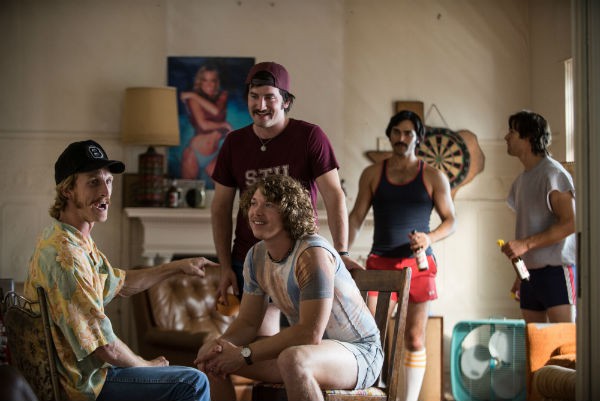
Nature has wisely arranged things so that we live through our youth while we’re young. With the energy we expend in our teens and twenties, and the changes we must navigate, we’d never survive otherwise.
Richard Linklater’s new comedy, Everybody Wants Some!!, captures this sentiment nicely. Set in the fall of 1980, it follows a group of young, perpetually horny college baseball players in Texas. Like many of Linklater’s films, all the way back to Slacker, it meanders and drifts, less interested in plot than in characters, situations, and moments. Linklater has billed the movie as a spiritual successor to his seventies paean, Dazed and Confused. In another way, it continues 2014’s Boyhood, which ends where Everybody picks up: in the first days of college.
Incoming freshman Jake (Blake Jenner) is a promising pitcher. He’s been placed in off-campus housing with the baseball team, a dubious administrative decision that leads to the first of many Animal House-style parties. We gradually meet the rest of the team: Upperclassman Finn and McReynolds are dismissive of freshmen in general and pitchers in particular. California transfer student Willoughby brings the dope and surfer wisdom. Niles, from Detroit, is an alpha dog who’s wound several twists too tight.
It’s so nice to be in the hands of a talented filmmaker like Linklater, who refuses to let his characters devolve into stereotypes. Just as in Dazed, the weird specifics of each cast member bounce off one another, generating authentic ensemble comedy. Everything that happens in the house, from playing ping-pong to smoking pot, becomes a competition. Ballplayers—what are you gonna do?
If the movie has an arc, it’s about the boys’ relentless pursuit of sex, an impulse Linklater treats as entirely natural and healthy. Going wherever the girls are, they roam like pack animals to the disco, the country bar, the punk show, and the theater party. In a rare moment of self-reflection, one jock observes, “Whenever we’re around baseball, all we talk about is girls. But whenever we’re around girls, all we talk about is baseball.”
Moments like this suggest the film’s quiet cleverness. On the surface, Everybody looks like a college comedy jammed with eighties nostalgia—Space Invaders, Devo, terrible mustaches. But there’s no toxic irony curdling it into a That ’80s Show-style burlesque. The movie’s primary colors are laughter, enthusiasm, and joy, and the dialogue is funny and revealing.
“I actually don’t think at all,” Finn says. “I just talk a lot.” That’s the trick, isn’t it? These are not thoughtful guys, but they live in the moment, and so does the film, in which Linklater reaffirms his place as our best chronicler of American Zen. Alright, alright, alright.
This article appeared in print with the headline “American Zen”
 Miles Ahead, the Miles Davis biopic Cheadle’s been shepherding for more than a decade, is a fascinating bookend to that audition tape. It’s his baby all the way—he co-writes, directs, and plays the title role—and it’s as much a testament to his journey through the Hollywood system as it is a tribute to Davis.
Miles Ahead, the Miles Davis biopic Cheadle’s been shepherding for more than a decade, is a fascinating bookend to that audition tape. It’s his baby all the way—he co-writes, directs, and plays the title role—and it’s as much a testament to his journey through the Hollywood system as it is a tribute to Davis.